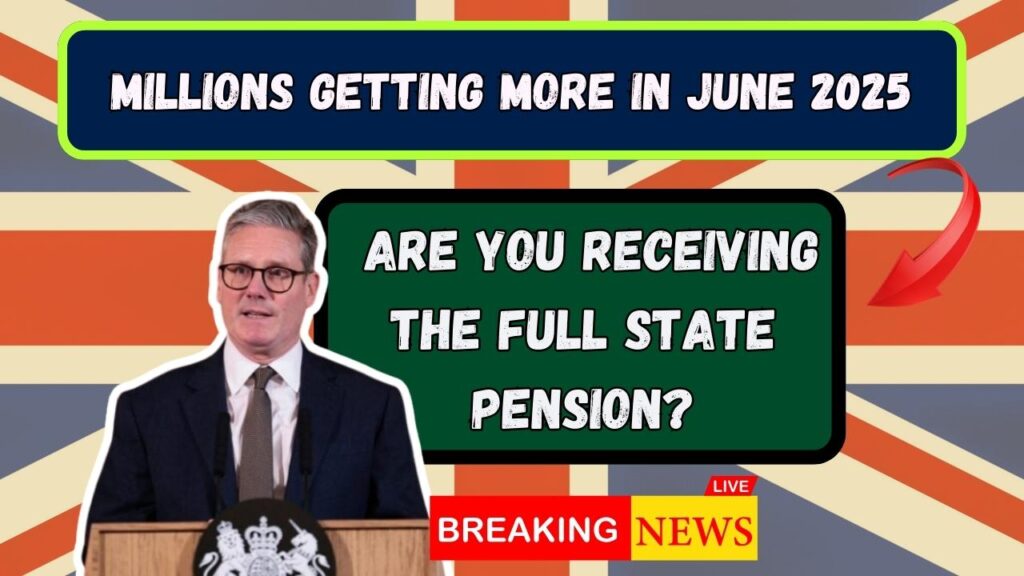Millions Getting More in June 2025; Are You Receiving the Full State Pension?
Millions Getting More in June 2025 – If you’re a State Pension recipient in the UK, here’s some good news: millions are getting a pay bump starting April 2025, with more noticeable changes kicking in by June 2025. But here’s the kicker — not everyone will get the full payout. So, the real question is: Are you getting what you’re truly owed? Let’s break it all down — no jargon, no fuss, just facts, money tips, and how to check if you’re one of the lucky ones.

Whether you’re retired or planning ahead, the UK State Pension system just got a fresh upgrade, and we’re here to help you cash in.
Millions Getting More in June 2025
| Key Details | Info |
|---|---|
| Payout Increase From | April 2025 |
| Full New State Pension (Weekly) | £230.25 (up from £221.20) |
| Annual Rise (New State Pension) | Approx. £470 |
| Triple Lock Mechanism | Wage Growth (8.5%) triggered the increase |
| Minimum Years for Eligibility | 10 qualifying National Insurance years |
| Years Needed for Full Pension | 35 years (new), 30 years (basic) |
| Pension Credit Guarantee Level | £227.10 (single), £346.60 (couples) |
| Official Forecast Tool | Gov.uk – State Pension Forecast |
| Number of Unclaimed Pension Credit Claims | Estimated 800,000 households |
The June 2025 State Pension increase isn’t just a technical update — it’s a real boost for your pocket. But whether you’re seeing the full benefit depends on your National Insurance record. From the triple lock guarantee to Pension Credit extras, there’s more to your retirement income than just the weekly check.
Be proactive. Check your status. Fill in the gaps. Diversify your retirement income. And make sure you — or your loved ones — aren’t missing out on what’s rightfully yours. Because this isn’t just about money — it’s about living with dignity and security in retirement.
What’s the Buzz About June 2025 Payouts?
Okay, here’s the scoop: starting April 2025, the UK government increased State Pension payments by a solid 8.5%. But many pensioners will start seeing the full benefit reflected by June, depending on when their regular payment dates fall. For millions, it’s like a delayed payday bonus. You didn’t win the lottery — but hey, it might feel like you did!
This hike follows the triple lock promise, which guarantees pension increases will always match the highest of three: inflation, average wage growth, or 2.5%. This year, wage growth took the lead.
That’s why the full New State Pension is jumping from £221.20 to £230.25 per week, or about £11,975 per year — not bad, right?
Are You Getting the Full State Pension?
Let’s not assume everybody’s cashing in the full amount. Whether you are or not depends mostly on your National Insurance (NI) contributions.
New State Pension (For those retiring after April 6, 2016)
If you hit retirement age after April 6, 2016, you’re on the new system.
- To get the full £230.25/week, you need 35 years of qualifying National Insurance contributions.
- To get anything at all, you need at least 10 qualifying years.
So, if you’ve worked, say, 22 years — your pension will be pro-rated based on your record.
Basic State Pension (Before April 6, 2016 retirees)
- You’ll get the old rate, which is about £169.50/week for most.
- Full eligibility requires 30 qualifying years of NI.
If you’re short, you might get less — or need to top it up voluntarily.
How to Check Your Pension Entitlement?
Before you start dreaming of beach holidays and grandkid shopping sprees, it’s smart to check your real numbers. The UK government offers an official tool:
Check Your State Pension Forecast
This tool will:
- Tell you exactly how much pension you’ll get
- Highlight any gaps in your NI record
- Let you know when you’ll hit State Pension age
You can use it for free, anytime — all you need is your National Insurance number and a Government Gateway account.
Missed Out on Years? You Can Fix That
Did you spend time abroad? Took a break to raise kids? Self-employed for a while? All legit reasons why your NI record might have gaps.
But here’s the deal: you can make voluntary Class 3 contributions to boost your total. It’s like buying your way into a higher pension — legally and smartly.
- Each year of Class 3 NI costs around £824.20
- But it could boost your pension by over £300 a year
- Which means you break even in under 3 years
That’s a deal even Warren Buffett would tip his hat to.
Don’t Forget Pension Credit – The Hidden Gem
While the State Pension is nice, Pension Credit is the safety net you shouldn’t ignore — especially if your income is low.
As of April 2025:
- Single pensioners get at least £227.10 per week
- Couples get up to £346.60 per week
And here’s the kicker — claiming Pension Credit opens the door to other perks:
- Free NHS dental
- Warm Home Discount
- Free TV licence (if you’re over 75)
- Help with rent via Housing Benefit
But get this — nearly 800,000 eligible pensioners haven’t claimed it. That’s a lot of money left on the table. Don’t be one of them. You can check and apply here: Pension Credit – GOV.UK
What’s Behind the Big Boost in 2025?
Let’s break it down. The triple lock system is designed to protect pensions from falling behind the cost of living. In 2025:
- Wage growth (8.5%) was higher than inflation (6.7%) and 2.5%
- So pensions rose 8.5%, even though inflation is easing
This is important because pensioners often face higher inflation due to spending more on essentials like food, energy, and healthcare.
So while the headlines say “inflation down,” your shopping bill may disagree — and this pension bump helps bridge that reality.
How Will This Affect You Long-Term?
If you’re already receiving the full pension, great — you’re winning the triple lock game. But if you’re still in the workforce, now’s the time to:
- Check your NI record
- Fill any gaps
- Plan for retirement (hint: don’t rely on the State Pension alone)
Think of the State Pension like the base of your income cake — you still need frosting from workplace pensions, private investments, or ISAs.
And remember, the triple lock isn’t guaranteed forever. Politicians debate it every election cycle, and any future government could freeze or tweak the rules.
Practical Tips to Maximize Your Pension
Tip #1: Get Your NI Record
Visit Your NI Record to:
- View all the years you’ve paid in
- Spot any “missing” years
- Learn if you can buy extra years
Tip #2: Sign Up for Pension Credit
Even if you’re unsure, check eligibility. Worst case? You don’t qualify. Best case? Free cash and perks.
Tip #3: Consider Deferring Your State Pension
You can delay your pension and increase your payout:
- Deferring for a year could boost it by about 5.8%
- Great if you’re working a bit longer or don’t need the money yet
Tip #4: Explore Other Retirement Income Sources
Consider:
- Workplace pensions (auto-enrolled in most jobs)
- Personal pensions (like SIPP)
- ISAs for tax-free savings
- Annuities if you prefer fixed income
Diversifying can give you more peace of mind than relying on the State Pension alone.
DWP Cancels 222,000 PIP Payments — Check If You’re Affected and The Reason Behind it!
DWP Benefits Update: Check Your Payments Details After Recent Date Change
Thousands on Universal Credit to Get Unexpected DWP Payments This Week: Check Details!
FAQs About Millions Getting More in June 2025
Q: What’s the full New State Pension in 2025?
A: £230.25 per week, or about £11,975 per year.
Q: How many years of NI contributions do I need?
A: 35 years for full pension under the new system. Minimum of 10 years for partial pension.
Q: Can I boost my pension if I’m short on years?
A: Yes. You can pay Class 3 voluntary contributions for missing years.
Q: What is the “triple lock”?
A: A rule ensuring pensions rise annually by the highest of inflation, wage growth, or 2.5%.
Q: Is Pension Credit the same as State Pension?
A: Nope. Pension Credit is a top-up for low-income pensioners — separate from the State Pension.
Q: Where do I check how much I’ll get?
A: Use the official government forecast tool.
Q: What if I continue working after State Pension age?
A: You can work while collecting your pension, and your income might still grow thanks to private or workplace pensions.







